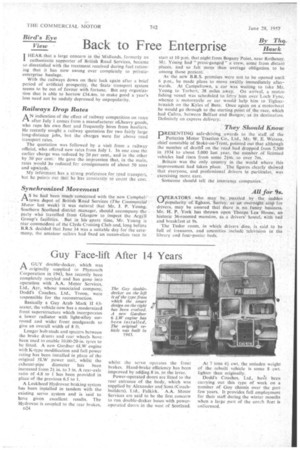Back to Free Enterprise
Page 80

If you've noticed an error in this article please click here to report it so we can fix it.
By Th.), Hawk
I HEAR that a large concern in the Midlands, formerly an enthusiastic supporter of British Road Services, became so dissatisfied with the treatment received during fuel rationing that it has now swung over completely to privateenterprise haulage.
With the railways down on their luck again after a brief period of artificial prosperity, the State transport system seems to be out of favour with fortune. But any organization that is able to borrow £54.4m. to make good a year's loss need not be unduly depressed by unpopularity.
Railways Drop Rates
AN indication of the effect of railway competition on rates after July 1 comes from a manufacturer ofiheavy goods, who runs his own fleet and frequently hires from hauliers, He recently sought a railway quotation for two fairly large long-distance jobs, but the charges were far above road transport rates.
The quotation was followed by a visit from a railway official, who offered new rates from July 1. In one case the earlier charge was reduced by 20 per cent., and in the other by 30 per cent. He gave the impression that, in the main, rates :would be reduced_ for consignments of about 50 tons and upwards. • My informant has a strong preference for road transport, but he points out that he has constantly to count the cost.
Synchronized Movement
AS he had been much`coneerried with the new Campbel;' town depot of British Road Services (The Commereial :Motor last week) it was natural that Mr. J. P. Young, Southern Scotland district manager, should accompany the . party who travelled from GlasgOw to insioect the Argyll Group's facilities. But in his spare time, Mr. Young is rear commedore of the Clyde Cruising Club and, long before B.R.S. decided that June 14 was a suitable day for the ceremony, the amateur sailors had fixed an ocean-class race to
start at 10 p.m. that night from Bogany Point, near Rothesay. Mr. _Young had " press-ganged " a crew, some from distant places, and so felt mote than average obligation to be among those present:
As the new B.R.S. premises were not to be opened until 6 p.m., he made plans to move swiftly immediately afterwards. At Campeltown, a car was waiting to take Mr. Young to Torbert; 38 miles away. On arrival, a motorfishing vessel was scheduled to fdrry him over Loch Fyne, whence a motorcycle or car wouldhelp him to Tighnabruaich on the Kyles of 13ute. Once again on a motorboat he Would go through to the starting point of the race, which had Cultra, between Belfast and Bangor, as its destination. Definitely an express delivery.
. They Should Know
PRESENTING safe-driving awards to the staff of the Potteries Motor Traction Co., Ltd., Mr. W. E. Watson, chief constable of Stoke-on-Trent, pointed out that although the number of death g on the 'road had dropped from 7,300. in 1934 to about 5,000 last year, the number of licensed vehicles had risen from some 2-fm, to over 7m. - Britain was the Only country in -the world whereimprovement had taken place. The figures clearly shoed that everyone, and professional drivers in partieular, was exercising more care.,
Someone should tell the insurance companies.
All for 9s,,
OPERATORS who may be puzzled by the sudden popularity of Egbam, Surrey; aS.an overnight stop for drivers, may be assured that there is, no. funny business. Mr. H. P. York has thrown open Thorpe Lea House, an historic 36-roomed mansion, as a drivers' hostel, with bed and breakfast at 9s.
The Tudor room, in which drivers dine, is said to be full of -treasures, and amenities include television in the library and four-poster beds.








































































































































